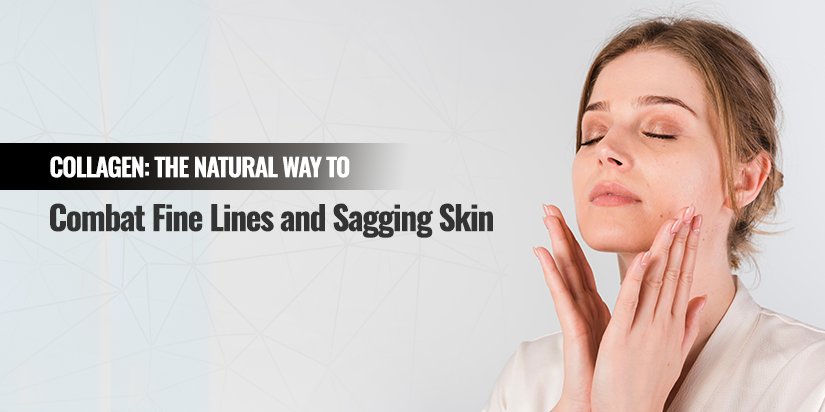When you look in the mirror and notice the first faint lines around your eyes or that your cheeks aren’t quite as firm as they used to be, you’re witnessing the natural slowdown of collagen. This vital protein, often called the “building block” of youthful skin, quietly supports firmness, elasticity, and glow.
But as the years pass, collagen production decreases, leading to wrinkles, sagging, and loss of radiance. The good news? With the right choices; diet, lifestyle, and collagen supplements, you can give your skin a renewed foundation from within.
What is Collagen and Why Does It Matter for Skin?
Collagen is the most abundant protein in the human body, forming the structural support for skin, hair, nails, joints, and even bones. Think of it as the scaffolding that keeps skin smooth, plump, and resilient. When collagen is abundant, skin appears youthful and hydrated; when it declines, fine lines and sagging begin to appear.
In fact, studies suggest that after the age of 25, collagen levels begin to drop by about 1% each year (Ref: https://pubmed.ncbi.nlm.nih.gov/24401291/). This steady reduction highlights why collagen for skin has become such a popular topic in beauty and wellness.
How Collagen Loss Shows Up on Your Skin
Collagen loss doesn’t happen overnight, it’s a gradual process with visible signs:
- Fine lines and wrinkles: The skin loses elasticity, making creases more visible.
- Sagging and drooping: With weaker support, cheeks, jawlines, and under-eyes lose firmness.
- Dullness and dryness: Collagen also helps maintain skin hydration, so its decline can leave skin looking tired.
Environmental stressors such as UV rays, pollution, stress, and poor diet can speed up this breakdown. That’s why boosting collagen for anti-aging isn’t just about vanity, it’s about protecting the skin from everyday damage.
Benefits of Collagen for Skin Health
Collagen isn’t just a buzzword; science backs up its importance. Here are some key collagen benefits for skin:
- Improves elasticity: Skin looks firmer and more lifted.
- Smooths wrinkles: Helps reduce the depth of fine lines.
- Enhances hydration: Keeps the skin soft, supple, and glowing.
- Supports healing: Plays a role in skin renewal and repair.
- Promotes resilience: Strengthens the skin’s structure against damage.
Dr. Dawn Davis, a dermatologist at the Mayo Clinic, emphasized that “At this time, we do not have any strong evidence that any over-the-counter oral or topical collagen supplement is good for anti-aging.” Instead, she recommends lifestyle measures, such as wearing sunscreen, avoiding smoking and excessive alcohol, to support the skin’s natural collagen and elastin.
Collagen Supplements: Do They Really Work?
This is often where curiosity meets skepticism: can a powder, capsule, or drink really change your skin? Emerging research suggests the answer leans toward yes.
A 2021 meta-analysis published in Nutrients reviewed 26 clinical trials and found that hydrolyzed collagen supplementation significantly improved skin hydration, elasticity, and reduced wrinkles compared to placebo (PMC).
Another 2019 randomized controlled trial reported that women who took collagen peptides for 12 weeks experienced measurable improvements in skin hydration, elasticity, and smoothness (MDPI).
The evidence indicates that collagen for anti aging can be a supportive tool. However, experts like those at the Mayo Clinic caution that while early findings are promising, collagen supplements should be paired with proven lifestyle habits; sunscreen, sleep, a nutrient-rich diet, and hydration, for the best results (Mayo Clinic News Network).
Who Should Consider Collagen and When to Start
One common misconception is that collagen is only for people in their 40s or 50s. In reality, prevention begins much earlier. Since collagen starts declining in the mid-20s, starting collagen supplements in your 20s or 30s can help slow the visible signs of aging.
- Early 20s to 30s: Focus on prevention, maintaining skin’s elasticity before lines deepen.
- 30s to 40s: Collagen for skin can help reduce the appearance of fine lines and maintain hydration.
- 40s and beyond: Collagen for anti aging becomes even more essential to restore firmness and reduce sagging.
Whether you’re just noticing subtle changes or already addressing visible wrinkles, collagen can be a valuable ally at any stage.
Final Thoughts
Fine lines and sagging skin may be natural, but they don’t have to define how you feel about your appearance. By understanding collagen’s role and embracing ways to support it, through diet, skincare, and collagen supplements, you can strengthen your skin’s foundation and maintain a youthful glow.
Science continues to highlight collagen benefits for skin, from improved elasticity to reduced wrinkles, making it one of the most reliable allies in the fight against premature aging. So if you’ve been wondering whether collagen for anti-aging really works, the evidence, and countless glowing faces suggest it’s worth exploring.

















